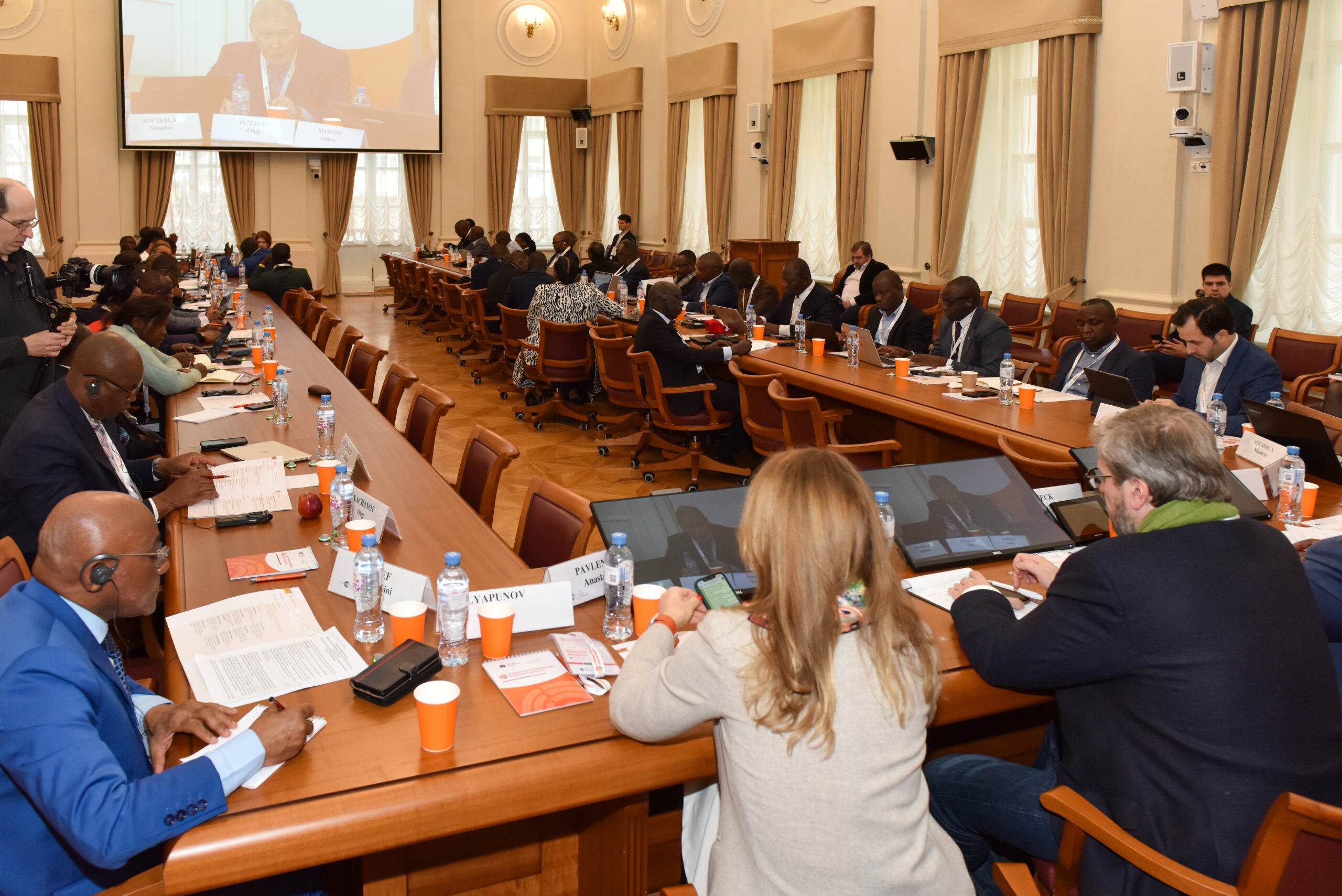Launch of the E-Governance Knowledge Sharing Week
18 December 2023
On December 18, 2023, Moscow hosted the opening ceremony of the E-Governance Knowledge Sharing Week. During the event, representatives of Russia and Africa discussed the scientific and technological potential of both sides, the challenges of digital transformation, and the prospects for cooperation.
The opening session was addressed by Andrey Maslov, Director of the Center for African Studies at the National Research University Higher School of Economics and Coordinator of the Program, Oleg Ozerov, Ambassador-at-Large and Head of the Secretariat of the Russia-Africa Partnership Forum, Igor Lyapunov, Senior Vice President for Information Security at Rostelecom and General Director of Rostelecom-Solar, Alexandr Pavlov, Director General of the Russian Foundation for the Development of Information Technologies (RFRIT).
From the African side, the leading experts in digitalization delivered welcoming speeches, including: Kamalidini Souef, Minister of Posts, Telecommunications and Digital Economy of the Union of Comoros, Moctar Seck, Head of Innovation and Technology Sector of the UN Economic Commission for Africa, Tafadzwa Muguti, Permanent Secretary in the Office of the President of the Republic of Zimbabwe, Nkundwe Mwasaga, Director General of the Information and Communication Technologies Commission of the Republic of Tanzania.
The opening ceremony was moderated by Fyodor Lukyanov, Editor-in-Chief of Russia in Global Politics, Research Professor at the HSE University, Chairman of the Presidium of the Council on Foreign and Defense Policy. In his opening speech, Mr. Lukyanov emphasized the growth of Russia’s international activity, especially in relations with African countries. He noted that changes at the economic, political and socio-cultural levels expand opportunities for cooperation. The E-Governance Knowledge Sharing Program was noted as “extremely instructive” in this context.
Andrey Maslov, the Director of the HSE Center for African Studies and Coordinator of the Program, emphasized the uniqueness of the analytical base of the E-Governance Knowledge Hub portal, launched within the Program, with detailed information on digital public administration in African countries.
In his opening remarks, Oleg Ozerov stressed that the E-Governance Knowledge Sharing Program and the Week itself are a practical implementation of the declaration and action plan of the Russia-Africa Partnership Forum. He reiterated Russia’s readiness to cooperate and expand partnership with African countries.
For his part, Мoctar Seck, Head of Innovation and Technology Sector of the UNECA, pointed out the positive impact of digitalization on the economic growth of African countries and the importance of using technology to enhance food security. In his speech, he praised the Russian experience, recognizing the importance of the presented handbook “E-Governance in Africa 2024” in assessing the current level of technological development of the countries of the continent.
Igor Lyapunov, Senior Vice President for Information Security at Rostelecom and General Director of Rostelecom-Solar, highlighted the indispensable role of digitalization in improving governance and communication between the state and the population. He mentioned the security challenges associated with digitalization and commended Russia’s experience in creating digital sovereignty.
Alexandr Pavlov, Director General of the Russian Foundation for the Development of Information Technologies (RFRIT), raised the issues of sanctions pressure and foreign vendors leaving the Russian market. He emphasized support measures from the Russian Government, such as the creation of industrial centers of competence and financial instruments for the development of the domestic market. Pavlov emphasized the importance of cooperation with foreign partners, especially in the field of digital security.
During the event, Tafadzwa Muguti, Permanent Secretary in the Office of the President of the Republic of Zimbabwe, recognized the relevance of the e-Governance Knowledge Sharing Program and its significance for creating a fundamental partnership between African countries and Russia. He highlighted areas of priority cooperation, such as improving electronic systems for monitoring the performance of civil servants and expanding access to mobile communications.
Nkundwe Mwasaga, Director General of the Information and Communication Technologies Commission of the Republic of Tanzania, drew attention to the size of the African markets and the opportunities for accelerating the digital transformation of the continent through cooperation. Thus, he stated the need to establish platforms for collaboration and seamless communication. He noted that in order to achieve this and develop their own technology markets, African countries need to partner with a country with a high level of digital development, such as Russia.
Kamalidini Souef, Minister of Posts, Telecommunications and Digital Economy of the Union of Comoros, emphasized the relevance of the initiative and the importance of the Russian Federation’s support to African countries in the process of digital transformation. The Minister further highlighted the Program’s alignment with the 17 Sustainable Development Goals by 2030 set by the UN member states and the goals of the African Union set in Agenda 2063.
The discussion emphasized the vast prospects for cooperation between Russia and African countries in the field of digital transformation. All participants expressed a common interest and willingness to further deepen interaction, which underlines the importance of developing the Knowledge Sharing Program and sharing experiences to jointly overcome challenges and achieve digital sovereignty.

 search
search



